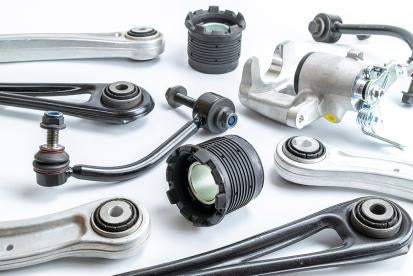This report helps automotive suppliers inform their legal and operational decisions to help address challenges and opportunities.
Key Developments
-
LMC Automotive estimates U.S. new light-vehicle sales reached a SAAR of 15.1 million units in October, representing an increase of 11% from October 2021, but a decrease of 14% from October 2020. LMC is projecting full-year 2022 new light-vehicle sales of 13.7 million units.
-
New vehicle prices in October averaged 33% above pre-pandemic levels, and up to five million U.S. consumers are still waiting to buy new vehicles, according to data from J.D. Power excerpted in The Wall Street Journal and the Associated Press. The analysis also indicates consumers can expect “a continued, slight mitigation on new-vehicle prices.” However, rapid price drops are not anticipated in the near-term.
-
Edmunds estimates the average annual percentage rate on new-car loans reached 6.3% in October, and in the coming months APRs could reach their highest levels in over a decade, according to data excerpted in Bloomberg.
-
Toyota lowered its full-year production guidance by 500,000 vehicles to 9.2 million vehicles, citing market headwinds including semiconductor supply shortages.
-
Argo AI is reported to be winding down operations after its key backers, Ford and Volkswagen, indicated they will cease investing in the autonomous vehicle technology company. Ford stated it will reduce capital spending on Level 4 advanced driver-assist systems to prioritize the internal development of L2+/L3 technologies.
-
Ford reported a third-quarter profit loss of $827 million, which was attributed to a $2.7 billion non-cash pretax impairment on its investment in Argo AI. Revenue was up 10% year over year to $39 billion, but the quarter was impacted by approximately 40,000 vehicles awaiting parts, as well as $1 billion in higher-than-expected supplier payments.
-
Electric vehicles and low emissions technology:
-
Government officials from the EU, South Korea and Japan continue to express concerns over the implications of automotive sourcing requirements applying to EV tax credits in the U.S. Inflation Reduction Act.
-
Bloomberg reports automakers including Ford have asked the U.S. Department of Treasury for clarity and flexibility regarding certain provisions affecting EV tax credit eligibility.
-
A report in Supply Chain Dive addresses a number of the challenges in establishing a U.S.-based supply chain for EV batteries, including limited domestic reserves of key raw materials such as lithium. For additional context on this topic, a recent article in Foley & Lardner’s Supply Chain Disruption Series provides an overview of current issues affecting the production and supply of lithium-ion batteries.
-
A new report from S&P Global Mobility assesses risk factors which could impact the supply chain for battery raw materials, including geopolitical tensions, ESG concerns and high commodity prices. [Press release only, full report not publicly available]
-
The European Union reached a provisional agreement which could require all new passenger cars sold in the bloc to be zero-emissions vehicles beginning in 2035.
-
Market Trends and Regulatory
-
LMC Automotive estimates the production share of global automaker brands in China has declined to 47%, from 54% in 2019, due to increasing market penetration by domestic Chinese brands in the nation.
-
Transport Topics reports a number of industry representatives expressed concerns during a recent public hearing pertaining to California’s proposed Advanced Clean Fleets Regulation, including the availability of charging infrastructure, and the impact on vehicle cost and performance. The state hopes to achieve a zero-emission truck and bus fleet by 2045.
-
Law360 reports a number of states and industry organizations asked the D.C. Circuit to strike down U.S. Environmental Protection Agency regulations which strengthen greenhouse gas standards for auto emissions, arguing the agency has overstepped its authority.
OEMs/Suppliers
-
Magna International will invest over $500 million at three sites in Michigan to support production of battery components and seating parts.
-
Lear announced plans to invest $80 million on a new manufacturing facility in Michigan after winning a contract to exclusively supply the battery disconnect unit on all full-size SUVs and trucks built on GM’s Ultium EV platform through 2030.
-
Stellantis reported third-quarter revenue of 42 billion euros, representing an increase of 29%, compared to the same period last year. The automaker indicated its vehicle deliveries rose 13% in the quarter, amid improved supplies of semiconductors.
Connected/Autonomous Vehicles and Mobility Services
-
California-based lidar makers Ouster and Velodyne announced plans to merge, in a transaction which will result in shareholders owning approximately 50% of the combined company. The deal is expected to close in the first half of 2023.
-
Bloomberg reports automakers are using lidar more frequently in production vehicles to improve the functionality of advanced driver assistance systems (ADAS). Lidar has thus far been used primarily for highly specialized autonomous vehicles. However, it is expected to receive a broader rollout as prices decline for the technology.
Electric Vehicles and Low Emissions Technology
-
Hyundai broke ground on its $5.5 billion electric vehicle and battery plant in Georgia, and production is expected to start during 2025.This represents the automaker’s first EV plant in the U.S.
-
Panasonic started construction on its new battery plant in Kansas last week, and production is expected to begin in 2025.
-
The Biden Administration announced the Fiscal Year 2022 recipients of the U.S. EPA’s Clean School Bus Program, which will award nearly $1 billion to 389 school districts across the nation.
-
A report by the Fuels Institute indicates the expansion of public EV charging infrastructure in the U.S. could be impeded by inadequate zoning requirements and permitting processes.
-
A report in Bloomberg assesses a number of ramifications associated with Buy America requirements for certain federally-funded EV charging projects.
-
GM and Houston-based Microvast intend to jointly develop separator technology for EV batteries, and build a new separator plant in the U.S. The project will be supported by a $200 million grant funded by the Bipartisan Infrastructure Law.
-
Electric work truck manufacturer VIA Motors moved its headquarters to Auburn Hills, MI, to a site that will act as a hub for the company’s vehicle design and testing.






 i
i


